The AMD Ryzen Threadripper 1950X and 1920X Review: CPUs on Steroids
by Ian Cutress on August 10, 2017 9:00 AM ESTCPU Legacy Tests
Our legacy tests represent benchmarks that were once at the height of their time. Some of these are industry standard synthetics, and we have data going back over 10 years. All of the data here has been rerun on Windows 10, and we plan to go back several generations of components to see how performance has evolved.
All of our benchmark results can also be found in our benchmark engine, Bench.
3D Particle Movement v1
3DPM is a self-penned benchmark, taking basic 3D movement algorithms used in Brownian Motion simulations and testing them for speed. High floating point performance, MHz and IPC wins in the single thread version, whereas the multithread version has to handle the threads and loves more cores. This is the original version, written in the style of a typical non-computer science student coding up an algorithm for their theoretical problem, and comes without any non-obvious optimizations not already performed by the compiler, such as false sharing.
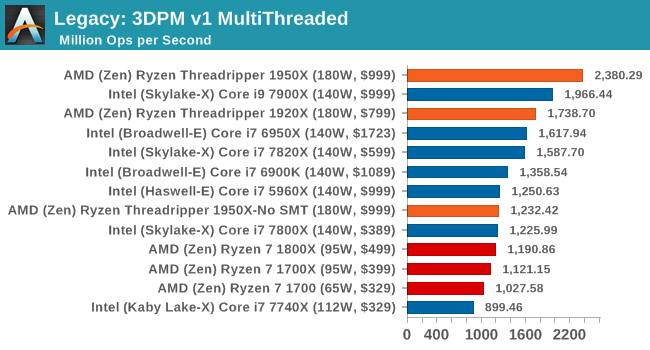
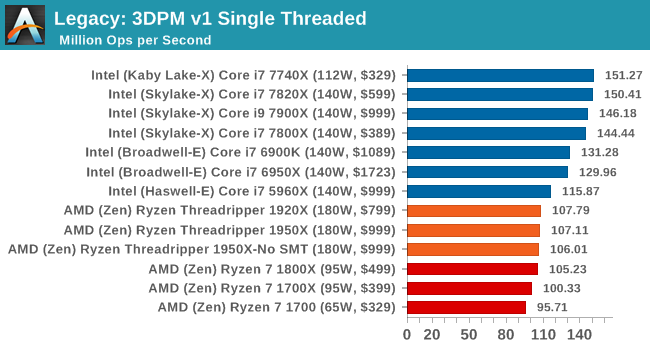
CineBench 11.5 and 10
Cinebench is a widely known benchmarking tool for measuring performance relative to MAXON's animation software Cinema 4D. Cinebench has been optimized over a decade and focuses on purely CPU horsepower, meaning if there is a discrepancy in pure throughput characteristics, Cinebench is likely to show that discrepancy. Arguably other software doesn't make use of all the tools available, so the real world relevance might purely be academic, but given our large database of data for Cinebench it seems difficult to ignore a small five minute test. We run the modern version 15 in this test, as well as the older 11.5 and 10 due to our back data.
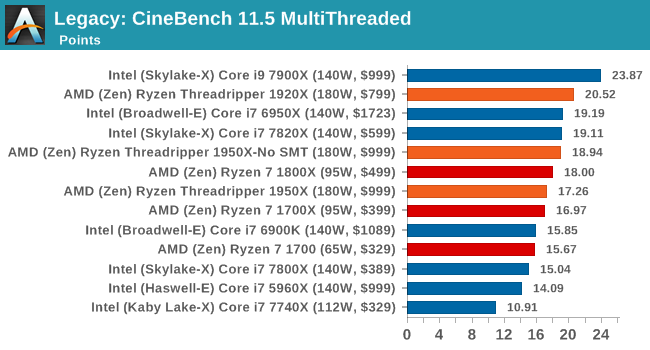
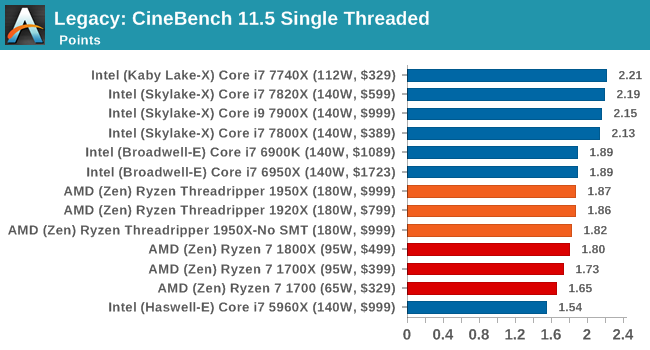
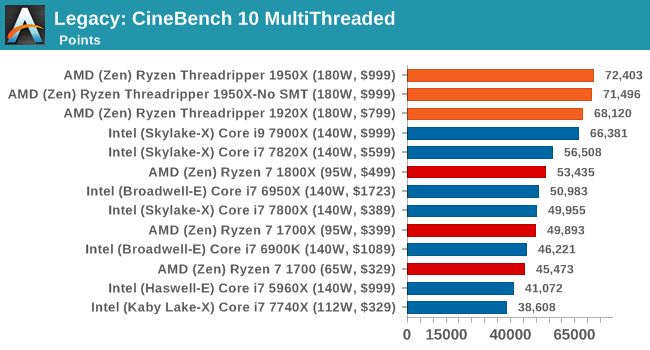
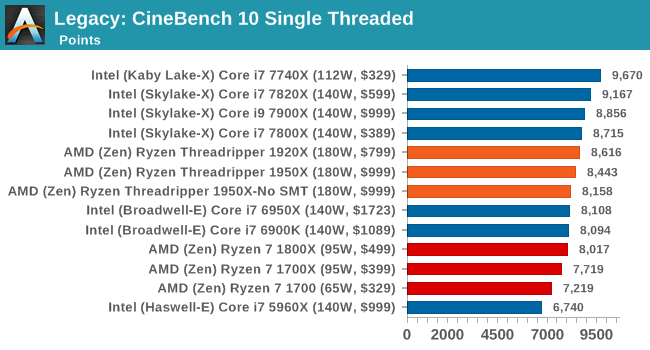
x264 HD 3.0
Similarly, the x264 HD 3.0 package we use here is also kept for historic regressional data. The latest version is 5.0.1, and encodes a 1080p video clip into a high-quality x264 file. Version 3.0 only performs the same test on a 720p file, and in most circumstances the software performance hits its limit on high-end processors, but still works well for mainstream and low-end. Also, this version only takes a few minutes, whereas the latest can take over 90 minutes to run.
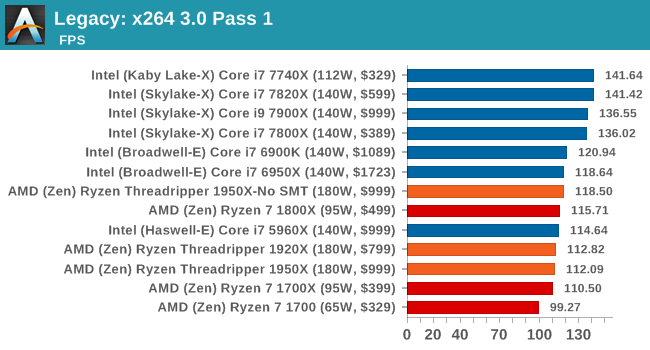
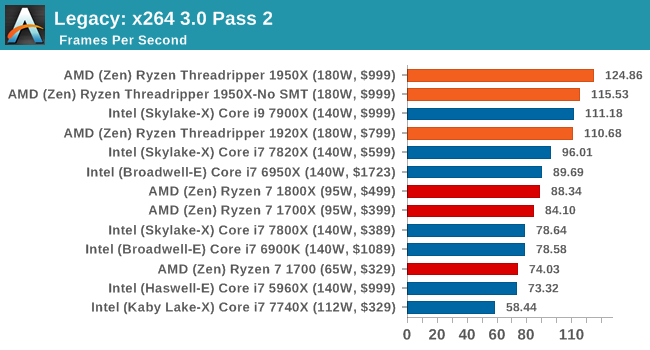
The 1950X: the first CPU to score higher on the 2nd pass of this test than it does on the first pass.










347 Comments
View All Comments
mapesdhs - Friday, August 11, 2017 - link
And consoles are on the verge of moving to many-cores main CPUs. The inevitable dev change will spill over into PC gaming.RoboJ1M - Friday, August 11, 2017 - link
On the verge?All major consoles have had a greater core count than consumer CPUs, not to mention complex memory architectures, since, what, 2005?
One suspects the PC market has been benefiting from this for quite some time.
RoboJ1M - Friday, August 11, 2017 - link
Specifically, the 360 had 3 general purpose CPU coresAnd the PS3 had one general purpose CPU core and 7 short pipeline coprocessors that could only read and write to their caches. They had to be fed by the CPU core.
The 360 had unified program and graphics ram (still not common on PC!)
As well as it's large high speed cache.
The PS3 had septate program and video ram.
The Xbox one and PS4 were super boring pcs in boxes. But they did have 8 core CPUs. The x1x is interesting. It's got unified ram that runs at ludicrous speed. Sadly it will only be used for running games in 1800p to 2160p at 30 to 60 FPS :(
mlambert890 - Saturday, August 12, 2017 - link
Why do people constantly assume this is purely time/market economics?Not everything can *be* parallelized. Do people really not get that? It isn't just developers targeting a market. There are tasks that *can't be parallelized* because of the practical reality of dependencies. Executing ahead and out of order can only go so far before you have an inverse effect. Everyone could have 40 core CPUs... It doesn't mean that *gaming workloads* will be able to scale out that well.
The work that lends itself best to parallelization is the rendering pipeline and that's already entirely on the GPU (which is already massively parallel)
Magichands8 - Thursday, August 10, 2017 - link
I think what AMD did here though is fantastic. In my mind, creating a switch to change modes vastly adds to the value of the chip. I can now maximize performance based upon workload and software profile and that brings me closer to having the best of both worlds from one CPU.Notmyusualid - Sunday, August 13, 2017 - link
@ rtho782I agree it is a mess, and also, it is not AMDs fault.
I've have a 14c/28t Broadwell chip for over a year now, and I cannot launch Tomb Raider with HT on, nor GTA5. But most s/w is indifferent to the amount of cores presented to them, it would seem to me.
BrokenCrayons - Thursday, August 10, 2017 - link
Great review but the word "traditional" is used heavily. Given the short lifespan of computer parts and the nature of consumer electronics, I'd suggest that there isn't enough time or emotional attachment to establish a tradition of any sort. Motherboards sockets and market segments, for instance, might be better described in other ways unless it's becoming traditional in the review business to call older product designs traditional. :)mkozakewich - Monday, August 14, 2017 - link
Oh man, but we'll still gnash our teeth at our broken tech traditions!lefty2 - Thursday, August 10, 2017 - link
It's pretty useless measuring power alone. You need to measure efficiency (performance /watt).So yeah, a 16 core CPU draws more power than a 10 core, but it also probably doing a lot more work.
Diji1 - Thursday, August 10, 2017 - link
Er why don't you just do it yourself, they've already given you the numbers.